

Make sure there are a variety of non-digestible (for us) plant fibers for the bacteria that keep us healthy.
* There is no one diet that is good for everyone. Our genetics determine the complex details of our metabolism. For example, someone who doesn't convert beta carotene into Vitamin A efficiently, won't do as well on a vegan diet in the long run. For some, a high fat diet is a disaster.
* If you choose a restrictive diet (e.g. no animal products, mostly raw, no dairy, or low carb) don't rely only on diet fan-sites. Find out about what the potential pitfalls there are so that you can supplement if necessary. Sometimes it takes time for a diet to negatively impact your health. You may even feel great at the beginning.
* Some diets make you feel great because you are adding foods that were missing, or removing foods that were impacting your health.
* Many diets are missing important micronutrients. Pay attention to nutrient density.
Diet and the Gut Microbiome.
Intermittent Fasting. Weight Loss. Cookware. Advanced Glycation Endproducts (AGEs) The Perfect Health Diet. Low-Carbohydrate and Ketogenic Diets with Some Cautions. Paleo Diet and Lifestyle.
Autoimmune Diets. Anti-Inflammatory Diets. Gluten-Free Diets.
Low FODMAP Diets. Mediterranean Diet. MIND Diet. Alkaline Diet. Bean Protocol. Vegetarian and Vegan Diets. Raw versus Cooked. Carnivory. More Named Diets. 18 Food Swaps for a Healthier Pantry. Eating healthfully at every single meal can be a challenge, but simply replacing some of your usual pantry staples with healthier options can help in a really big way!

When we’re hungry, we tend to reach for what’s on hand. Nutrigenomics: Does Food Influence How Our Genes Behave? “It’s in my genes” is a phrase most of us have uttered at one time or another.
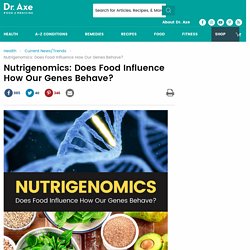
For some it might equate to eating a lot of fatty foods without ever gaining an ounce, while for others it might mean an increased risk to a certain disease because it “runs in the family.” But what if your genes aren’t relegated to how you’re born, but can be changed by your own actions — namely, the foods you eat? Nutritional Rehabilitation: GAPS, SCD, Paleo…Whatever. I like the phrase “Nutritional Rehab” for those of us who are fighting to regain health by shunning the common, modern diet and enriching our diet with traditional, real foods.
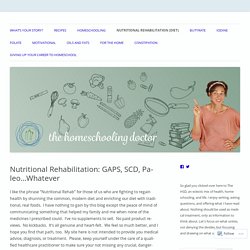
I have nothing to gain by this blog except the peace of mind of communicating something that helped my family and me when none of the medicines I prescribed could. I’ve no supplements to sell. No paid product reviews. No kickbacks. It’s all genuine and heart-felt. Most of the grain-free diets overlap immensely, and I think after you get comfortable on one, it’s helpful to learn about the others. 11 Largest Nutrition Lies in the Media (#6 Caused a Dietary Disaster) You can’t believe everything you hear.
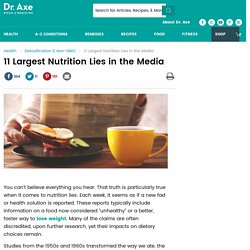
That truth is particularly true when it comes to nutrition lies. Each week, it seems as if a new fad or health solution is reported. These reports typically include information on a food now considered “unhealthy” or a better, faster way to lose weight. Many of the claims are often discredited, upon further research, yet their impacts on dietary choices remain.
Studies from the 1950s and 1960s transformed the way we ate, the foods we ate and the amount we ate. Nutrition lies in the media are common; studies subsidized by pharmaceutical companies, food manufacturers and food associations are often tilted to make the public believe that one food is healthier than another to spur sales and increase visibility. Here are the facts, based on true medical research, to debunk common nutrition misconceptions. 11 Graphs That Show Everything That is Wrong With The Modern Diet. The modern diet is the main reason why people all over the world are fatter and sicker than ever before.
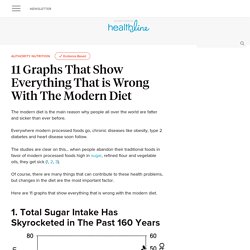
Everywhere modern processed foods go, chronic diseases like obesity, type 2 diabetes and heart disease soon follow. The studies are clear on this... when people abandon their traditional foods in favor of modern processed foods high in sugar, refined flour and vegetable oils, they get sick (1, 2, 3). Of course, there are many things that can contribute to these health problems, but changes in the diet are the most important factor. The Myth of “Eat Right and Exercise” Reposted from my ‘Friday Boost’ sent to my patients: I received an email the other day that included the well-worn phrase “eat right and exercise.”

The writer was making an ironic comment on such advice. Why Healthy Diets Fail - 180 Degree Health. By Matt Stone There is a lot of hype surrounding various “healthy diets.”
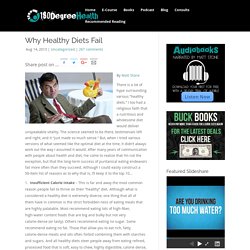
I too had a religious faith that a nutritious and wholesome diet would deliver unspeakable vitality. The science seemed to be there, testimonials left and right, and it “just made so much sense.” But, when I tried various versions of what seemed like the optimal diet at the time, it didn’t always work out the way I assumed it would. After many years of communication with people about health and diet, I’ve come to realize that I’m not the exception, but that the long-term success of puritanical eating endeavors fail more often than they succeed. When Are Starches OK in a Diet?
Marathon Drugs Increases Price 70-Fold – 2/10/17 More predation by pharma.
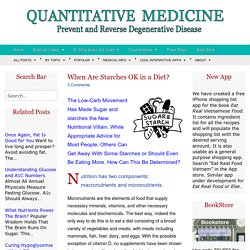
Marathon has gotten a decades old muscular dystrophy drug, deflazacort, approved and is charging $89,000 a year for it. It’s price in Europe is under $1500/year. Where are the free market forces? Why aren’t our elected officials protecting us from this egregious practice? Lowest Stroke Rates in Older Baby Boomers; Younger People Rising– 9/12/16 reports the American Heart Association, here. A Dietitian Puts Extreme 'Clean Eating' Claims to The Test – And the Results Aren't Pretty. Sophie Medlin, King's College London “Clean eating” is associated with the healthy lifestyle and body beautiful that is promoted by many online bloggers.
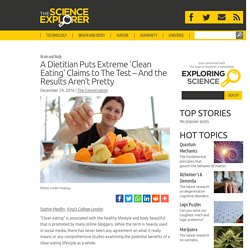
While the term is heavily used in social media, there has never been any agreement on what it really means or any comprehensive studies examining the potential benefits of a clean eating lifestyle as a whole. However, the core principles that the big names in this movement champion appear to be: eliminate processed food; reduce salt intake; eat more vegetables; choose whole grains; eliminate refined sugar; reduce alcohol. For some, you also need to be gluten, dairy, and soya free and to eat raw (depending on how militant you are, food has to be entirely uncooked or only mildly heated). And if you want to be completely “clean” you should probably be vegan, too. There is significant research disproving many of the principles of the diet. 7 Ways The Low-Fat Diet Can Wreck Your Health. 7 Low-Fat Diet Risks You Need to Know About! Fats are an essential nutrient and one of the primary energy sources for the body.
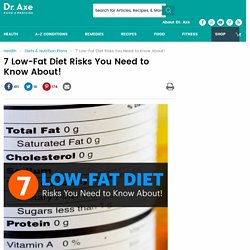
They also play a big role in weight management, absorbing nutrients, maintaining healthy skin and hair, regulating body temperature, supporting immune function, insulating internal organs, and hormonal balance. You can see right off the bat why there are just so many low-fat diet risks to be aware of! While a balanced diet that includes plenty of plant foods, like vegetables and some fruit, is key for long-term health, fats are actually needed to properly absorb the fat-soluble vitamins found in many plants — including vitamin A, D, E and K. Beyond Good and Evil - The Weston A. Price Foundation. Are You Undereating? Here Are 6 Common Signs and Symptoms.